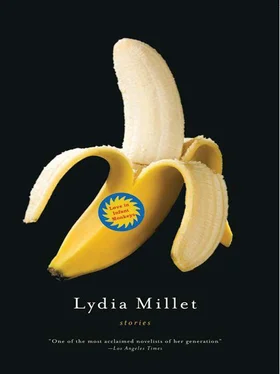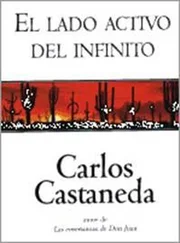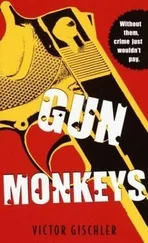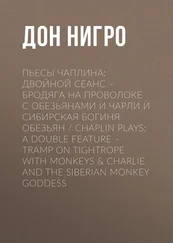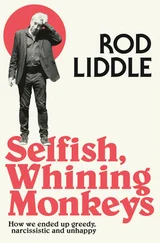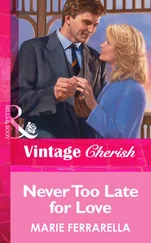“I can’t make her do anything,” said Chomsky.
“We actually have one of those we don’t use, I think,” said K. to the harried mother, wanting to help. “My daughter outgrew it. What I don’t know is where it ended up.”
The little girl was telling Chomsky that the dartboard she had at home was felt, with orange Velcro balls to throw.
“Yeah. Well. Thanks anyway,” said the mother to K., beginning to edge toward the door.
“I tell Mom I want real ones,” said the little girl.
“But all she says is, ‘You could take an eye out.’ That’s all she says.”
“God damn it,” cried the harried mother. One of her bare ankles was jammed into the wire hook of a coat hanger that protruded from a thick jumble underneath a table. She kicked it free awkwardly — the heavy baby leaning sideways, sacklike — and then stumbled, slamming her elbow into a shelf. The gerbil condo fell to the floor.
“Is it broken?” asked the granddaughter quickly.
Chomsky knelt down and lifted it, frowning. K. noticed the mother’s ankle was actually nicked, a bright, small jab of blood. The baby cried louder and the mother twisted to look past it to the floor.
“Was it rusted? Just take a look, could you, and tell me if it was rusty,” she said to K., almost pleading.
He bent down beside her leg. Several hangers were completely rusted, others not at all.
“I don’t think I can tell,” he said. “Some of them are, though. Yeah.”
“It’s broken,” announced Chomsky gloomily, and tapped the bottom of the cage. “The structural integrity has been compromised.”
“Do I need to get a shot, do you think? Tetanus?”
“For Chrissake, you’ll be fine, Melinda,” said Chomsky.
K. was shocked. He hadn’t realized Chomsky and the harried mother had a previous connection.
“I just gouged myself on a wire, Noam! Jesus! Teddy was up half the night crying and I’m exhausted! Jer’s away in the city! Could I have one second of sympathy?”
“I get so tired of the constant state of emergency,” said Chomsky. “Everything is a personal crisis . A kid spitting up is a crisis. A baby chair that’s missing is a major injustice. Frankly, it starts to feels like an exaggeration.”
“Oh. I see. So, things like this are never urgent to you?”
“Not really,” said Chomsky.
The harried mother, white-lipped, crossed her arms in front of the baby carrier and glared at him.
“For one thing, you’re not the one with vomit soaking into your bra, your back aching from a nine-month-old that already weighs twenty pounds and a bloody hole in the side of your foot. So it’s easy for you to be perfectly relaxed, isn’t it?”
“Crisis is big,” said Chomsky. “Crisis is not this trivial, daily texture of living.”
“Sure. If you’re a robot, that is,” said the harried mother.
K. had no excuse to be in the shed anymore but couldn’t tear himself away. He picked up a china figurine of a pig in a tutu and turned it upside down, pretending to scrutinize a maker’s mark.
“What I’m suggesting is that emotion can be channeled in productive directions,” said Chomsky.
“That’s not emotion you’re talking about. That’s just opinion.”
“Opinion—” started Chomsky, but she interrupted him.
“What you realize when you have a kid, if you’re a woman, is we’re animals and it’s hard to be an animal. It’s hard work. It’s dirt and danger and bile.”
“That particular brand of gender essentialism—”
“But what you also realize as a mother is — and I don’t think men really get this out of fatherhood, I think maybe they get it in other ways, like if they’re having great illicit sex or beating the living shit out of someone — is that it’s great to be an animal; it’s what the core of life is, to be an animal. Not to be human. I don’t mean to be human; I don’t mean that at all, Noam. I mean to be a mammal .”
“Oh, please,” said Chomsky. His granddaughter set down the dartboard again, a little disappointed.
“Say what you like,” said the mother. A coolness came into her voice and it occurred to K. she had a certain steely quality. “Say what you like about anything you want. I don’t care. But consider the possibility that there’s something here you can’t know. Something here you will never know , Noam. Something you will never know that would change everything .”
She pushed the door open and slammed out, leaving the three of them alone in the shed. It was just K., Chomsky and the granddaughter. The old scavenger woman had slipped out unnoticed.
K., standing over a table, had the odd impression that the light filtering through the dirty gray windows had shifted or been subdued — as though an object of enormous weight and strange design had moved silently in front of the sun.
For a second, motionless, he remembered the Hindenburg. Great airships of the past.
Chomsky turned his attention to the gerbil condo.
“See? Right there,” he said quietly to the little girl.
“It’s got this crack all the way across the bottom now, from that corner to this one.”
“But the gerbils wouldn’t mind,” said the little girl.
“Would they?”
“They might not,” conceded Chomsky. “It would work just as well for them. But the problem is, the people would probably mind.”
“How come?”
“They won’t pick it up,” said Chomsky. There was a heaviness to him now, and K. thought he looked older. “They won’t even take it now, is the thing. They’ll just think it’s junk, with a crack across the base like that.”
“Oh,” said the little girl. She blinked, and again K. thought tears were coming. She shook her head but refused to cry.
“Come on,” said Chomsky gently, and shifted the gerbil condo to hold it propped against his side so he could take her hand. “Let’s go.”
They walked out of the shed, their shoulders, to K., looking stooped. He watched out the window, still clutching the pig ballerina, as the two of them trudged toward the main garbage pit with their burden. When they reached the pit Chomsky stood at the railing for a long moment, holding the gerbil cage with his thin arms outstretched. Finally he let go.


HE CAME TO SEE me at my Atlanta office, after his move back to Plains. It was a slow afternoon and the day’s sessions were already over when the Secret Servicemen stepped into my foyer. I wasn’t expecting company; my first thought when I opened the door on them — with their clean-cut hair, dark suits and earpieces — was hearing-impaired Witnesses .
Then I caught sight of that broad, down-home grin.
Our families went to the same church when we were boys, and we had Bible Study together. He was an avid student, hand always shooting straight up with the answers, while I spent most of the class lobbing spit-balls at the back of a fat girl’s head. Our interests were different: One of us was strong and popular, the other was bookish, but it was a small town, and even though there were some differences between us we were thrown together often enough. We hung out, playing stickball in the meadow behind the general store, or ran a Cowboys ’n Injuns racket in a rotting tree house. Typically I was a cowboy and Carter was one of the braves. One time, if I remember right, he was a squaw.
Читать дальше
